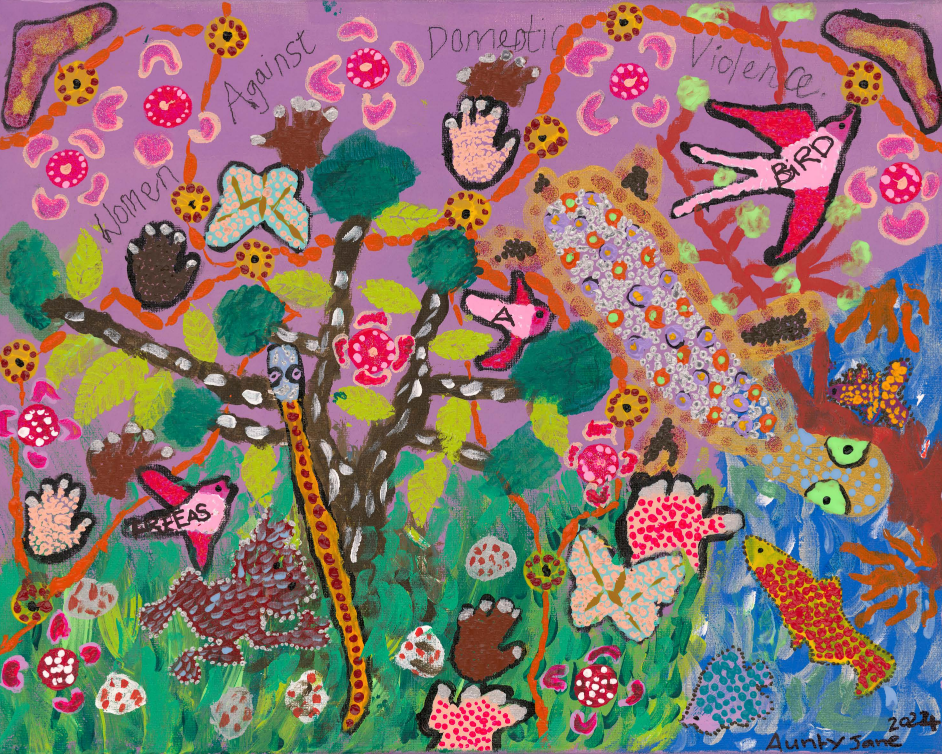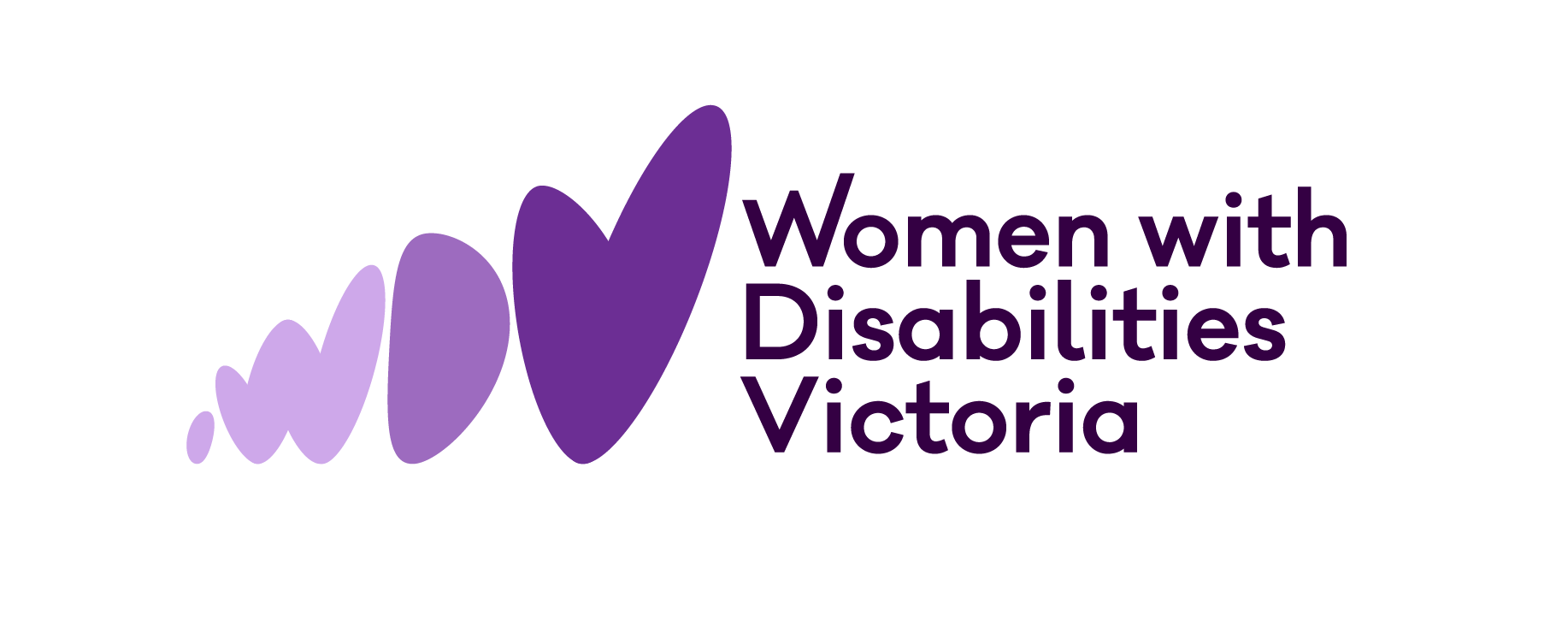Our Reconciliation Journey
Acknowledgement of Country
Women with Disabilities Victoria (WDV) respectfully acknowledges Aboriginal people as the Traditional Custodians of the lands and waters on which we work, rest, and continue to benefit from. We pay our respects to the Elders, past and present, of Aboriginal and Torres Strait Islander Communities across Victoria and acknowledge that their continued strength and resilience is built upon more than 60,000 years of history. The WDV community is committed to honouring the unique cultural and spiritual relationship Aboriginal and Torres Strait Islander peoples have with the land and waters, and their rich contribution to society.

About Our Artist
Proud Yorta Yorta woman Aunty Jane Rosengrave is a disability advocate and artist. Jane has an intellectual disability and is a fierce self-advocate and champion for others. Experiencing institutionalisation and abuse from a very young age Jane was kept from her culture and communities. She endured an abusive relationship and further disconnection for many years. But happily, Jane is free as a bird now.
Once kept from her Aboriginal culture, Jane now thrives within it. Jane is a proud Aunty in her community. Once denied the pride of being a part of the disabled community, Jane is now a leader, empowering others.
Jane is a WDV member and has worked on projects that address violence against women with disability. She bravely uses her story to support others, so they can be free as a bird one day too.
Jane has often appeared in the media and her strong advocacy has been shared with self-advocates across the country through workshops and training. In 2016 Jane joined the First Peoples Disability Network (FPDN) Board and is also on the Board at People with Disability Australia (PWDA). Jane was awarded the Tony Fitzgerald Memorial Award at the Australian Human Rights Awards 2016.
Regaining her connection with Country and culture, Jane now shows her identities, proudly. Her tattoos; a turtle, based on her tribe — Yorta Yorta and an Aboriginal flag worn with pride. Alongside them what has become Jane’s life motto, a ‘free as a bird’ tattoo. Storytelling through art has always been a part of Jane. Even when her culture was denied, deep down she knew the spirit was always within her. Jane’s painting is for the generations and for her communities. Her art connects her, it shows people who she is and what is important to her.
About the Artwork
Aunty Jane’s painting has natural and abstract features. The colours are vibrant and the brush strokes and dots of paint are textured on the canvas. There is a blue sea/river in the bottom right corner with a turtle and fish. An orange-coloured tree grows near it. To the left of the sea is green grass and a black tree with white dashes. The background of the painting is lilac. There is a frog and a snake in the grass area. There are birds and butterflies across the painting. The birds have the words “Free as a bird” written on them. There is a boomerang in the top right and left corners. There are hand shapes across the painting. The words “Women against domestic violence” is written across the top third of the painting. There is an orange line intersected by yellow and brown circles. There are ten pink circles with boomerang shapes around them. Please see Aunty Jane’s detailed description below for more.
“My name is Aunty Jane and I’d like to begin by paying my respects to the Aunties, Uncles, mums, dads, nieces, nephews, brothers and sisters, grandmas and grandpas and to the traditional custodians of this land on where we are meeting today, its Elders past and present, and the self-advocacy people who have passed away and who are still here today on Aboriginal land.
Now the painting, this is the sea with the fish in it (bottom right of painting where there is a blue and silver sea) and green weeds in it as well, and some of the white sand that’s in it. This is a long neck turtle, my tribe Yorta Yorta (light brown turtle with lilac, orange and green spots on its back, blue dots on its head and green eyes). And this is the orange tree growing in the river or in the sea with the leaves of the tree, the green trees, the branches on there. And this is the red dirt, the red dust with the Aboriginal organisations that are here in the background (a dashed line in orange with 12 intermittent yellow circles with reddy brown dots in them), and the boomerang here (a boomerang with a black outline, purple sparkles and gold sparkles in it). And these are the ladies (pink circles with pale pink dots in them surrounded by 4 pink boomerang shapes) that are talking about their domestic violence and other problems or health problems, and money wise, you know what they’re going through sitting in a circle here the on the grass (dark and light green grass at the bottom left of the painting).
And these are the birds (three dark and light pink birds that are flying from the bottom left to top right of the painting that have the words on them) that are going from domestic violence saying ‘free as a bird’ after what they’ve been through as well. These are the hands. These are for the white people (two hands made up of pale beige dots), and these ones are for the Aboriginal people (two hands made of dark brown dots). And these are the rocks (white circles with dark pink dots in them), and the frog (a dark brown frog with blue dots in the middle and a white dot outline), and the nut and the grass and the leaves that are on the tree as well (light green leaf shapes on a black tree shape with white dashes along the trunk and branches). And the butterflies that are flying away saying I’m as free as a bird as well after I’ve been through domestic violence” (two pale blue butterflies with pale pink dots and gold intersecting lines on them).
WDV’s Reflect Reconciliation Action Plan
We started our reconciliation journey in 2022, with our Reconciliation Action Plan (RAP) Working Group beginning work on our first Reflect RAP in 2023. WDV is an intersectional feminist organisation that has a strong sense of solidarity with First Nations people. We share a desire for self-determination and recognise the ongoing impact of colonisation as a contributing factor to the violence experienced by First Nations women and non-binary people with disabilities. Developing a RAP is a way for us to formalise our support and shift our intentions into actions.
As part of WDV’s emphasis on accessibility and inclusion, it felt important for us to consult our lived experience experts and include our members in the process of developing the RAP. Members of the Working Group held two consultations with WDV lived experience experts in July and September 2023. These consultations provided us with valuable insights into how we created our RAP and how to ensure accessibility.
Our Reflect RAP was formally endorsed by Reconciliation Australia in October 2024.
